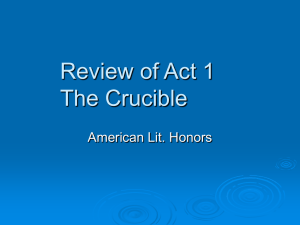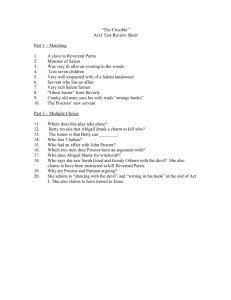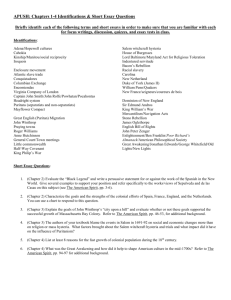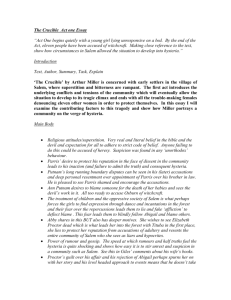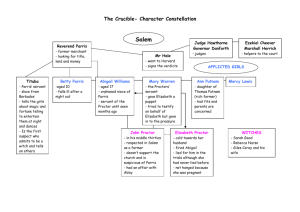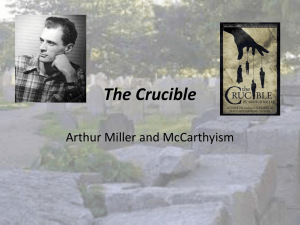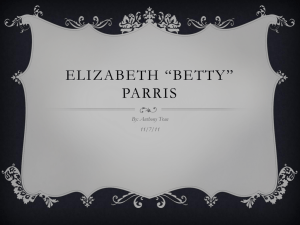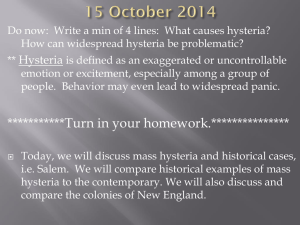Review of Act 1 The Crucible
advertisement
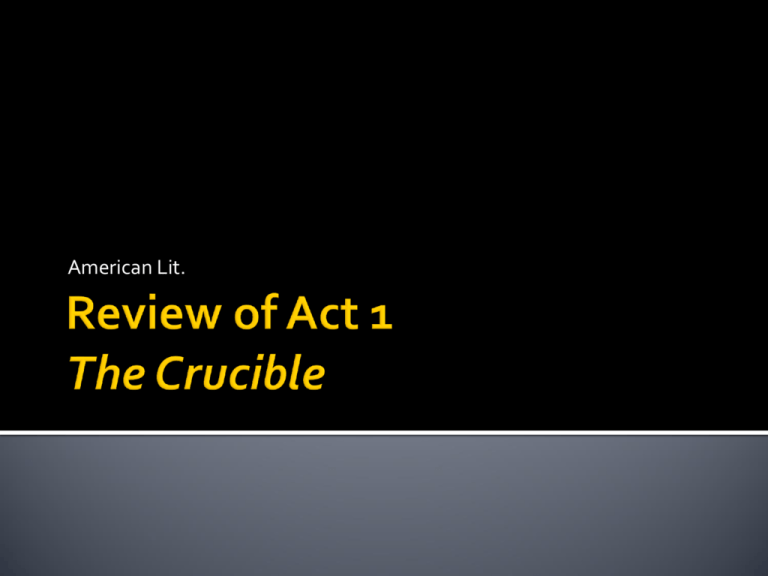
American Lit. Greed Jealousy Hysteria Illness Social Control Intolerance (Irony) McCarthyism Reputation Not well liked Why? Preaches too often about hell/finances Parris is a wormy little character. Miller says in his notes that he found nothing redeemable about the historical Parris. As a result, he evidently felt no need to make his fictional version any better. First of all Parris is greedy. John Proctor accuses Parris of this several times in the play. The Reverend gives weak justifications, but never denies any of the accusations. Some examples of Parris's greed include: quibbling over firewood, insisting on gratuitous golden candlesticks for the church, demanding (against time-honored tradition) that he have the deed to the house he lives in. Reverend Parris’s daughter falls sick after the girls are caught dancing in the forest and conjuring spirits though her sickness is feigned, it spurs on the witchcraft rumors and opens the door to future accusations Ann Putnam Seven babies died at birth She blames this on demonic spirits/witchcraft. Implicates Tituba because she had her daughter Ruth go to the forest and conjure spirits of the dead babies. Thomas Putnam “a man with many grievances” A. James Bayley was supposed to become minister of Salem. B. Had grievances against him because he was the eldest son of the richest man in the village. C. He attempted to contest his fathers will/stepbrother was going to receive more money than him. In order to preserve her name and to divert attention away from her, she condemns others. Blames Tituba for conjuring spirits and making her drink chicken blood. Liar/Harmful Controlling/Bully/Manipulator Threatens the girls of Salem to keep their mouths shut OR ELSE!! A Pawn Scapegoat A. Slave B. Has no social rank C. From Barbados (stereotype) is that they know more about witchcraft/superstitions) Recognizes Hypocrisy Tragically Flawed A. Christian man who has an affair with a 17 year old girl. B. He is married. Senses that Rev. Hale’s presence will cause more hysteria to be spread throughout Salem Village. Has the best of intentions outside pressures and growing hysteria will prove to add to the struggles of the play Complex character Goes through a major personal journey through the course of the play Well-intended, but full of himself. Young girls and daughters of squabbling families. Both afflicted with a “mysterious” illness Ruth has been known to act out (crazy) in court when her family was up against their enemies. In her 70s The people in Beverly speak well of her because of her charitable work in the village of Salem and neighboring villages as well. 83 years old Unknowingly accuses his wife of being involved in “peculiar” activities. A. Reading a book B. Giles is illiterate and naïve. Blamed for everything that goes wrong in the village.?? Because . . . He’s an easy target. Elizabeth's positive qualities are also her negative ones. virtuous woman who is steadfast and true traits also make her a bit of a cold fish When we first meet her, she's especially cold and fishy. She's got good reason to be, though, because her husband has recently had an affair with their housekeeper, Abigail Williams. Elizabeth's reaction to the affair reveals a bit of a vindictive streak. When she discovered her husband's sin, she gave Abby the boot For the most part, she’s a stand-up woman. Blameless victim Mary is a likeable enough character, but ultimately proves herself to be a bit spineless. She's one of the girls who was caught in the forest with Abigail, dancing and conjuring spirits – though we quickly learn that she just watched and did not participate. She becomes part of the court that condemns witches. At first she seems to enjoy the power it gives her. When clearly innocent people begin to be convicted, however, Mary feels bad about the whole thing. WHO WOULDN’T?!!! (Abigail) Oversees the witchcraft trials in Salem He likes to think of himself as fair-minded, so it disturbs and angers him to discover that people fear the court. He believes that no innocent person should fear the court, and that he and Judge Hathorne are guided by God, so nobody will be punished unjustly. As a result, he fails to examine evidence critically or to act when he could to stop the hysteria. Even at the end, when it’s obvious that the society is disintegrating, he refuses to see the role that the witchcraft trials and hangings have played in it.
